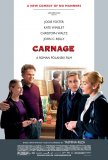Carnage (France/Germany/Poland, 2011)
December 12, 2011
Carnage is a French dark comedy made with an A-list cast and filmed in English. Adapted from the play God of Carnage by the play's scribe, Yasmina Reza, and director Roman Polanski, Carnage makes no attempt to "open up" the stage production. With the exception of a brief prologue and epilogue, the entire movie takes place within the confines of an upscale New York City apartment. Entirely dialogue-driven with almost no plot to speak of, the movie is unlikely to find mainstream appeal, although it should find some favor among art house aficionados.
The set-up is simple. Zachary, the son of Nancy and Alan Cowan (Kate Winslet and Christoph Waltz), has, during the course of a playground skirmish, injured Ethan, the son of Penelope and Michael Longstreet (Jodie Foster and John C. Reilly). In the aftermath, the two couples have gathered in the Longstreets' apartment to discuss in a civilized manner how to handle the situation. The initially cordial conversation becomes increasingly contentious and, once alcohol is added to the mix, inhibitions fall away and the gloves come off. In the ensuing melee, the characters frequently change allegiances and fractures in both marriages are exposed.
Carnage suffers from a common problem that afflicts many stage-to-screen adaptations: too much artifice and contrivance. The contortions necessary to keep the four characters together for 75 minutes strain credulity. In real life, the conversation would have been over in a half hour. In fact, at that point, Nancy and Alan are out the door and headed for the elevator when circumstances draw them back into the apartment. Things that work in the live, intimate environment of a theater often aren't as effective in a movie, and this is one case. Structure means little on the stage. What's important are the acting and dialogue. This is not strictly true on film.
Carnage offers little in the way of ponderous thematic issues unless one considers the somewhat clichéd concept that beneath humanity's civilized veneer lies a base creature. This is more of a comedy than a drama, although the weight of the humor emerges from Polanski's observations about the absurdity of human behavior than out of a traditionally comedic approach. This is often the case with French farce. In fact, many Americans do not find French comedies especially funny; there's a significant cultural gap here.
There are lengthy stretches during the course of Carnage when it feels more like an exercise in the delivery of dialogue than a genuine movie. Of course, we're dealing with four expert thespians, so there's a degree of pleasure in something as banal as that. But, even at a skinny 75 minutes, Carnage overstays its welcome. By the time things get going as the alcohol starts flowing, tedium has crept in. The film is at its most fun when alliances shift and accusations fly, but it takes a while before things have relaxed sufficiently for the characters to reveal their true selves.
In the company of three Oscar-winners (Foster, Winslet, Waltz), one might expect John C. Reilly, Mr. Everyman, to be out of place. (Although, to be fair, Reilly has been nominated.) Perhaps surprisingly, Reilly is Carnage's standout. That's not to impugn the work of Foster, Winslet, and Waltz, but Reilly upstages them all. His Michael, initially conciliatory, has many of the best lines and provides the most unforced laughter Carnage has to offer. As he and Alan become sloshed, they bond over the strangest things (such as the quality of Michael's scotch and cigars) as the women look on in disbelief.
Carnage makes an unsubtle but telling point about how the ubiquity of cell phones has fractured face-to-face interpersonal interaction. Alan repeatedly extracts himself from the conversation in order to answer the insistent ringing of his phone, then speaks so loudly that the others have to shout to be heard. When Michael makes a comment about something mentioned during a call, Alan is irritated that anyone would be "listening in." Eventually, Nancy provides a pointed lesson in cell phone etiquette.
It's an indicator of Polanski's reputation in the business that he was able to attract a cast of this magnitude for a movie with limited appeal (they presumably worked for scale). In some ways, Carnage feels more like an experiment than a full feature. The scripted nature of the dialogue is a part of the problem - the conversation is too stilted; it never sounds natural. Contrast this with what Eric Rohmer and Mike Leigh (for example) have achieved with similarly dialogue-laden productions. (Waltz also has audible problems with his New York accent.) As an opportunity to see four great actors doing little more than talking, boozing, and (in one case) vomiting, Carnage makes for an interesting diversion. As a full admission motion picture, however, it's not entirely successful.
Carnage (France/Germany/Poland, 2011)
Cast: Jodie Foster, Kate Winslet, Christoph Waltz, John C. Reilly
Screenplay: Yasmina Reza & Roman Polanski, based on the play God of Carnage by Reza
Cinematography: Pawel Edelman
Music: Alexandre Desplat
U.S. Distributor: Sony Classics
U.S. Release Date: 2011-12-16
MPAA Rating: "R" (Profanity)
Genre: COMEDY
Subtitles: none
Theatrical Aspect Ratio: 2.35:1

Comments